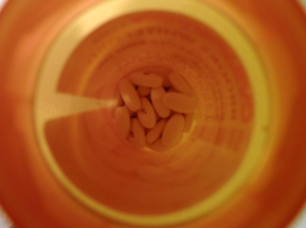Pandemic Pills

November 22, 2021
Prescription pills. Are they secret to getting out of this Coronavirus pandemic?
Recently, the pharmaceutical company Pfizer, which is known for its Covid-19 vaccine, applied for FDA approval on Tuesday, November 16th in regards to the Covid combating antiviral drug, Paxlovid. Paxlovid acts as a protease inhibitor that works by poisoning protease, the enzyme used when a virus replicates itself in a human cell and causes the virus to no longer be functional and spread the disease. It is recommended that a patient take six pills a day, four Paxlovid pills along with HIV drug, Ritonavir, acting as a booster for Paxlovid to remain in the body longer for five days. The efficacy of the drug is impressively high with an 89% reduction in the risk of hospitalization and death in adults.
However, Paxlovid is not the only oral pill to combat Covid-19. Big pharma company, Merck, developed Molnupiravir, which was approved in the UK on November 4th prior to Paxlovid. It was developed in the early 2000s to initially treat influenza but was built upon to fight SARS-CoV-2. Instead of working against protease, it mimics the RNA that is used to replicate and spread throughout the body to confuse the virus by making mistakes in its genetic code that cause it to mutate until it is no longer effective. The regimen is to take eight pills a day for five days. Molnupiravir proved 7.3% of people taking it were hospitalized in comparison to the 14.1% who took the placebo and were also admitted to the hospital.
The conversation of whether one should prefer Paxlovid or Molnupiravir has scientists on the front lines thinking. That decision is full of consideration about the mechanisms that the pills are based on. Merck’s drug has its functions dealing with placing errors in the virus’ genetic code to confuse it into duplicating itself until it is extinct. Concerns about the errors to the genetic code triggering genetic mutation have been raised and could potentially lead to reproductive issues. Currently, doctors prefer Paxlovid over Molnupiravir because the risk of potential infertility does not appear with protease inhibitors.
Pfizer has stated that if approved, they can produce enough pills to treat 180,000 people and the company plans to 50 million treatments in 2022 with 21 million or more being before June. The company also reached an agreement on Tuesday to let other companies make and sell Paxlovid inexpensively to be used in 95 developing countries.
With the current increase of Covid-19 cases and a potential fifth case surge that could hit in the winter, Paxlovid could lessen the number of hospitalizations and deaths immensely due to its high efficacy. Paxlovid and Molnupiravir could be the keys to achieving the post Covid-19 world the whole globe has been striving for at a more affordable price and higher availability. Vaccines and pills could be the ultimate duo during these hard times that lead to the reduction of Covid-19, which can open up so many doors for the future.
Works Cited:
Merck. “Merck and Ridgeback’s Investigational Oral Antiviral Molnupiravir Reduced the Risk of Hospitalization or Death by Approximately 50 Percent Compared to Placebo for Patients with Mild or Moderate COVID-19 in Positive Interim Analysis of Phase 3 Study.” Merck.com, 18 Nov. 2021, https://www.merck.com/news/merck-and-ridgebacks-investigational-oral-antiviral-molnupiravir-reduced-the-risk-of-hospitalization-or-death-by-approximately-50-percent-compared-to-placebo-for-patients-with-mild-or-moderat/.
Paúl, et al. “Pfizer Seeks FDA Approval for Covid-19 Pill Regimen, Strikes Global Manufacturing Deal.” The Washington Post, WP Company, 17 Nov. 2021, https://www.washingtonpost.com/nation/2021/11/16/covid-delta-variant-live-updates/.
Pfizer Asks F.D.A. to Authorize Covid Pill for High-Risk … https://www.nytimes.com/2021/11/16/business/pfizer-covid-pill-paxlovid-unvaccinated.html.
“Pfizer’s Novel Covid-19 Oral Antiviral Treatment Candidate Reduced Risk of Hospitalization or Death by 89% in Interim Analysis of Phase 2/3 Epic-HR Study.” Pfizer,





















































